
Welcome to The Regenerators.
Introduction
Climate change refers to the shift in the Earth’s usual weather conditions over many years.
Our world has been getting hotter due to things humans are doing, like burning huge amounts of fossil fuels, cutting down too many trees and over-farming crops and animals.
Climate change is the result of these actions and it's already putting humans, wildlife and the planet at risk.
But it's not too late. By working together, everyone can help. Our planet needs us.
You've got a message!
It's Fatima calling… from the future! She has climate change on her mind and an important message to share with you.
Fatima: Hey people in the past. Got to make this video for school, thankin' our climate heroes.
Fatima's friend: You actually makin' a video Fatima? Who'd you pick?
Fatima: These guys. Jus' people like us but years ago, that started livin' smart. Coz yeah, back in your day, the world was getting sick. People before you were feeding the atmosphere bad stuff.
Feedin' it too many greenhouse gases, like carbon dioxide and methane.
These extra gases were trappin' too much heat, stopping it from goin' into space. And all that heat was just stayin' here. Makin' the world get hotter and hotter. Changin' the climate.
Climate change. Heard of it? An' coz the world was gettin' hotter, you were gettin' all sorts of weird weather, makin' it a dangerous place to live and makin' it harder to grow food.
Things were gettin' seriously bad. So you all decided to do something about it. Takes a big person to be the change. And that's what you guys did, worked together to make a difference.
People used to be usin' planes and cars that let out fumes which polluted the air and added greenhouse gases to the atmosphere. It was bad for us, an' bad for the planet. But you guys changed all that, not flyin' when you didn't need to, changing cars powered by petrol to electric cars, an' takin' less journeys. And usin' bicycles, buses an' trains instead.
Coz the way we make energy affects the climate. Makin' energy by burnin' fossil fuels, like petrol, oil and gas - puts loads of carbon dioxide into the environment.
But you guys started usin' the energy of the environment itself.
Stuff like wind, solar and hydro power don't release greenhouse gases.
Fatima's friend: Hey Fatima? You eatin' that Snackz bar?
Fatima: Hey. You ain't havin' my Snackz bar. Leave it.
That's another big thing that was changing the climate.
What you guys were eatin'. Some people around the world were cutting down trees to make space for growing food. But this was messin' up the land and there were less trees to absorb carbon dioxide. An' sometimes that food was fed to cows and sheep which were burpin' and fartin' methane all over the place - even MORE greenhouse gases.
So instead you guys did something about it and started eating smarter. Just like I do now.
Basically, you guys started living smart. You became your best selves to give the planet the best chance.
So thanks for being my climate heroes.
What are greenhouse gases?
In the Earth's atmosphere there are small amounts of gases known as Greenhouse gasesGases such as water vapour, carbon dioxide and methane, in Earth’s atmosphere that trap heat.. These include carbon dioxide (CO₂), water vapour and methane.
Greenhouse gases form a layer around the Earth, which acts like a kind of fluffy blanket, trapping some of the heat radiating from the surface of the Earth and stopping it from escaping back out to space.
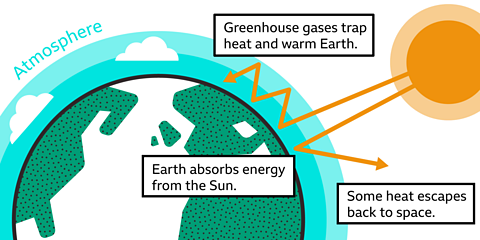
It's a bit like how the glass of a greenhouse traps heat inside.
Without our layer of greenhouse gases to keep us warm, we would all freeze!
What is the carbon cycle?
For a long time, our layer of greenhouse gases stayed roughly the same thickness, thanks to the carbon cycle.
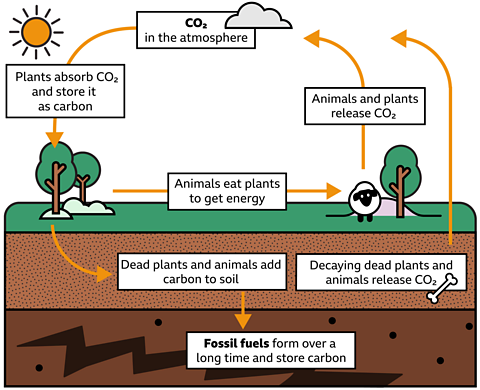
The constant cycling of carbon dioxide into and out of the atmosphere meant that, for the past 12,000 years or so, the levels of greenhouse gases in our atmosphere stayed roughly the same.
This led to a nice stable climate, creating just the right conditions for humans and animals to live.
What is global warming?
Due to a combination of human actions, our layer of greenhouse gases has been getting steadily thicker and, as a result, the Earth has been getting hotter. This is known as Global warmingThe increase in Earth’s average temperature, mostly caused by the build-up of greenhouse gases in the atmosphere. .
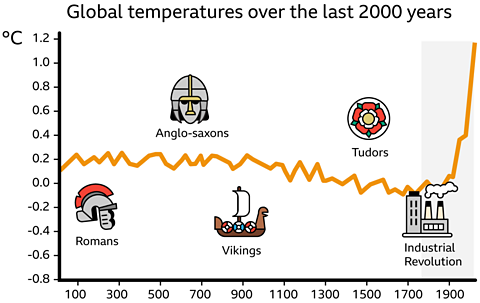
Over the past 150 years, the average temperature on our planet has increased by just over one degree Celsius.
That might not sound like much, but the amount of energy required to heat something as enormous as our planet by just one degree is equivalent to five atomic bombs going off in our atmosphere every second!
In fact, the Earth is now hotter than it has been in over 100,000 years.
What causes global warming?
Many of our activities have increased the levels of greenhouse gases in our atmosphere.
Energy
Since the start of the Industrial Revolution about 150 years ago, humans have been burning huge amounts of Fossil fuelsNatural fuels such as coal, oil, or gas formed from the remains of plants, animals and other organisms that died millions of years ago., such as coal, oil and gas, to provide us with useful energy for heating and electricity.
Most of our cars, lorries, ships and planes rely fossil fuels too.
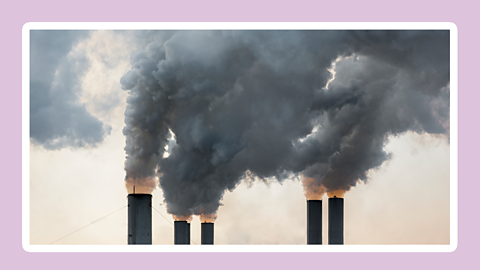
When fossil fuels are burned, the carbon that has been trapped inside them for millions of years is released into the atmosphere as carbon dioxide.
Food and farming
Humans have been chopping down billions of trees to provide wood and to clear land for farming, so there are now fewer trees to absorb carbon dioxide from our atmosphere.
To make matters worse, when the dead trees are burned, all the carbon that was stored inside is released back into the atmosphere as more carbon dioxide.
The use of modern intensive farming techniques is causing the soil to be repeatedly churned up, releasing the carbon stored in the soil back into the atmosphere as even more carbon dioxide.
To produce meat and dairy, humans have been farming more and more livestock (cows and sheep), which release methane in their burps and farts.
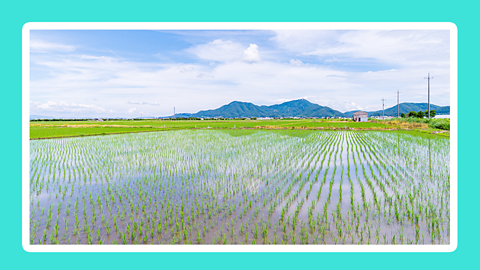
Methane is also released by flooded fields called paddy fields which are used to grow rice.
Even our food waste creates methane when it left to rot in landfill sites.
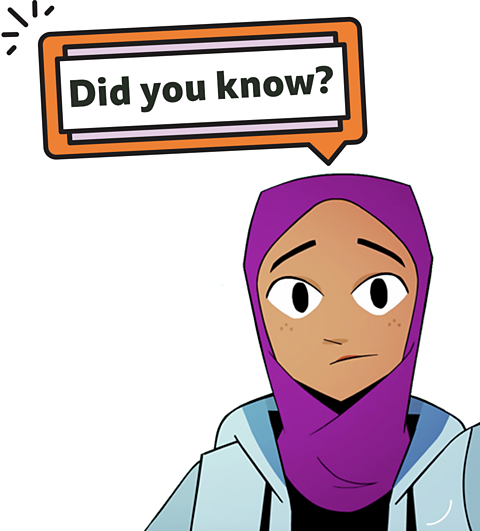
Did you know?
- Around 15 billion trees are being cut down every year. This releases about the same amount of carbon dioxide as driving 600 million cars.
- Some areas of the Amazon rainforest in Brazil are being cleared at a rate of three football fields every minute.
- There are around 1.5 billion cows on our planet. An average cow produces enough methane in a day to fill 15 party balloons!

Rising carbon dioxide levels
Carbon dioxide levels go up and down due to the Earth’s natural cycles.
This has been happening over tens of thousands of years, taking us into and out of ice ages.
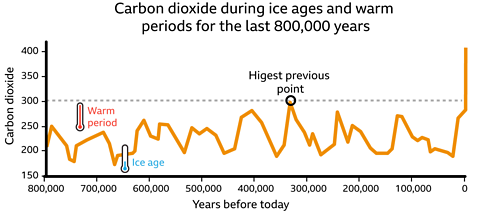
However, due to human actions, carbon dioxide levels today are rising 100 times faster than any of these natural increases.
There is now more carbon dioxide in our atmosphere than there has been in over 3 million years.
Watch this clip from Blue Peter as Mwaksy and Maddie find out about carbon dioxide and the pioneering work of climate scientist, Eunice Foote.
Why is climate change a problem?
Extreme weather
All of the extra heat energy trapped in our atmosphere, as the result of greenhouse gases from human activity, is causing major changes to our climate and producing more extreme weather.
Areas of the world that were already hot are getting even hotter and drier, increasing the chances of heatwaves, droughts and forest fires.
The extra heat is also causing more water to evaporate from our oceans to form clouds, so areas that were already wet are getting even wetter.
This increases the chances of other types of extreme weather, such as storms, hurricanes and floods.
Melting ice and rising seas
In the oceans, the extra heat is not only making it harder for sea creatures to survive, but it is also causing ocean water to expand, leading to rises in sea levels.
Warmer waters, along with warmer air, also leads to melting ice.

Melting sea ice causes problems for creatures like polar bears and penguins that need ice to hunt and survive.
When ice on land melts, like glaciers or ice sheets in Antarctica and Greenland, the water runs off into the sea, which causes sea levels to rise even further.
Climate change affects us all
Extreme weather and rising seas are already affecting many parts of the world, destroying the homes of humans and animals.
Changes in climate are also impacting our ability to grow food crops and to access clean drinking water, and increasing the spread of diseases.
Scientists are concerned that unless we make radical changes now, things could get a lot worse.
What can we do to help?
In the face of such a big problem, it’s understandable that you might feel worried or like you can’t do anything about it.
But we can all take responsibility and work together to fix this!
Major changes need to come from governments and businesses, but scientists say that if we all make small changes to our lives too, together we can have an impact.
There are lots of ways you can get involved. Be creative and follow what interests you or where you think you can make a difference.
Speak to people about how you feel. Listen and share ideas with them. Your actions will inspire others.
You are never too small to make a difference.
– Greta Thunberg
Lesson complete
Well done Regenerator, you've completed this lesson. Now let's see what you can remember.
Make a pledge
A pledge is a promise we make to do something. Writing down our pledges helps us to remember them.
Using what you've learnt in this lesson, make your own pledge to protect the world against climate change.
You could use words, drawings, collage or anything which feels special to you.
The Regenerators pledge. documentThe Regenerators pledge
GREEN CLASSROOM

There's more to learn
Explore more lessons and content from around the BBC.
What is the problem with plastic?
GREEN CLASSROOM

How can we look after our environment?
GREEN CLASSROOM
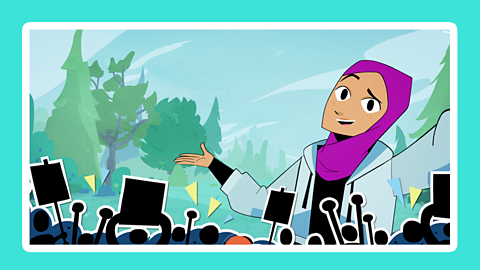
Year 3 - 6 and P4 - P7
GREEN CLASSROOM
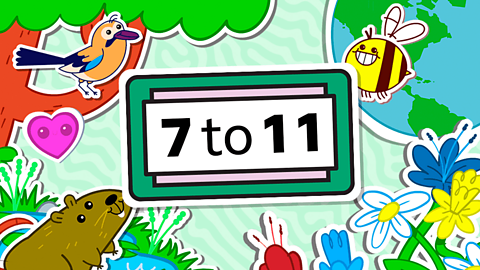
More from The Regenerators
BBC BITESIZE
